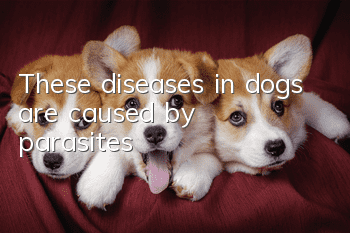These diseases in dogs are caused by parasites!

Dog owners sometimes wonder why their dogs suddenly become sick. However, the dog's illness may be caused by your failure to deworm the dog. Parasites are very harmful to dogs and can cause many diseases.
1. Canine liver clusterworm
Canine hepatitis is an infectious disease spread by ticks, but it is not contracted through bites. Canine hepatitis is an infectious disease transmitted by ticks. The route and method of tick transmission are different from Lyme disease or Ehrlichia. Both Lyme disease and Ehrlichia are caused by tick bites. It is an infectious disease, but the infection method of canine hepatitis is different. It does not come from the bite of a tick, but the dog becomes infected after eating a disease-carrying tick. Of course, although H. caninum is called "canine" H. canis, it does not only infect dogs. Cats can also be infected as long as they eat disease-carrying ticks. Therefore, H. canis can infect both dogs and cats.
Common symptoms of Canine hepatitis infection include vomiting, bloody diarrhea, fever, lack of energy, loss of appetite, gradual physical weakness, muscle and joint pain, etc. However, these clinical symptoms are not specific and cannot be diagnosed based on clinical symptoms. At the same time, these symptoms are very similar to the symptoms of other infectious diseases transmitted by ticks. However, in many cases, after being infected with Hepatitis canis, there will be no clinical symptoms. These interfering factors include imperfect immune systems, Immune anemia, steroid use, glomerulonephritis, severe tick infection, etc. In addition, this is also true in some young dogs. If they happen to suffer from ehrlichiosis, it will also cause interference in the diagnosis of the disease. Therefore, the examination of the blood smear has become very important, because from the blood smear, you can see that there are gametocytes of Hepatitis canis in the white blood cells, which is a very important basis for diagnosis.
2. Canine Ehrlichiosis
Ehrlichia canis is a blood parasitic infection that is very common in dogs. Ehrlichia is a rickettsial pathogen. It is transmitted through tick bites on the dog's skin. An infectious disease of purpose.
After Ehrlichia causes infection in dogs, it will enter the blood and parasitize in white blood cells and platelets. Of course, these Ehrlichia will not just let it go, and the damage to the blood system is just beginning. It is not easy to detect signs of infection in dogs infected with Ehrlichia in the early stages. The symptoms that can often be seen are often similar to those of other diseases. These symptoms include: fever, poor energy, and being sick all day long. Loss of sleep, loss of appetite, weight loss, and even vomiting.
It is actually very simple to check whether you have Ehrlichia. You only need to go to the hospital once every six months to receive a regular blood test for Ehrlichia. In less than ten minutes, you can know the results of the test. Of course, in addition to regular inspections,It is also necessary to prevent Ehrlichia infection, which is an infectious disease mainly transmitted by ticks.
3. Pyrozoism
Pyrozoon is a blood parasite that lives in the red blood cells of animals. In dogs, ticks are the main source of infection. The route of transmission in cats is not clear. In addition to ticks, sharing syringes and needles for blood transfusions Blood can also cause the spread of scorch worms.
The greatest harm caused by scorch worms to animals is anemia. Dogs that get scorch worms often suffer from poor mental appetite and become weaker. Their body temperature will rise, their weight will drop, and their gums and other mucous membranes will change. If the symptoms of jaundice appear, the mucosal surface will also become yellow, and sometimes you can even see patches of bleeding spots on the surface of the body. In addition, ascites, edema of surrounding tissues, etc. are related to the heart. Symptoms related to the vascular system may also occur in some dogs infected with pyrozoon, and some gastrointestinal and neurological symptoms may also occur. The clinical symptoms of cats and dogs are roughly the same. Cat pyrozoonosis usually occurs in young cats, such as poor mental appetite, increased breathing rate, diarrhea, thicker fur, pale mucous membranes, rapid heartbeat, fever, etc. , are very common.
Since scorch worms are mainly transmitted by ticks, the prevention and control of ticks has become relatively important. It is very important for dogs to use tick-removing drugs for prevention. If you find a tick on your dog, do not force it to scratch it or squeeze it to avoid infecting yourself.
- What happens when a cat vomits after eating? What should you do if a cat vomits?
- Australian Shepherd personality traits
- Can dogs eat mangosteen? Why?
- What should I do if my Labrador loses a lot of hair in summer?
- Does the Basenji have a high IQ and how does it shed? Is it expensive?
- Dogs don’t know how to defecate on time? Then you should train like this
- What are the training methods and precautions for small Shiba Inu?
- What's wrong with your dog sneezing? He's in good spirits.
- How long does it take for a dog to suffer from rat poison?
- Do golden retrievers have body odor? How to get rid of golden retriever body odor?



